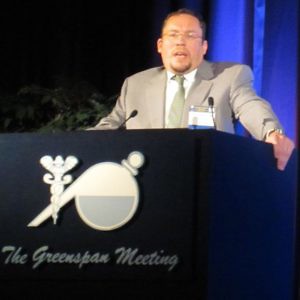Kite Pharma Challenges and Opportunities Post-IPO $KITE
At ASCO 2014, one of the posters that attracted a lot of attention was the one from Kite Pharma ($KITE) on their rapid cell expansion (RACE) technology for the production of engineered autologous T cell therapy.

As regular blog readers will know, we’ve been following the development of CD19-targeted T cells for the treatment of B cell malignancies such as CLL, ALL and aggressive NHL for some time.
Back in Autumn 2012, at the Chemotherapy Foundation Symposium (CFS) in NYC, more commonly known as the “Greenspan” meeting after the late Dr Ezra Greenspan, we heard presentations on early CAR-T cell data from Dr Renier Brentjens (pictured right) of Memorial-Sloan Kettering Cancer Center (MSKCC) and Dr Michael Kalos from the University of Pennsylvania (Penn).
At ASH 2012, we wrote about the data presented by Dr Carl June in the Ernest Beutler Prize Lecture. Dr Blazar, who jointly received the award, gave this quote from Dr Beutler, which is a reminder of why basic science is worthy of funding, and how important it is to innovation:
“The tendency to merely elaborate on what many others are doing arises, at least in part, from the almost universal misconception that our understanding of nature is profound, that most or all of the basic concepts have already been discovered, and that success in science consists of filling in the blanks with large teams of collaborators.”
What started off as pure academic research, has within a short period of time, become a hot (if not the hottest) area of immunotherapy drug development as inspired by the potential of early data, companies and investors pour money into commercializing CAR-T cell therapy.
Novartis had obtained the exclusive rights to Penn’s CTL019 CAR-T cell therapy in August 2012 at what now seems a bargain price.
Juno Therapeutics was subsequently created with $176M in Series A private equity funding at the end of 2013 to commercialize the CAR-T cell research of Memorial Sloan Kettering in New York and Seattle’s Fred Hutchinson Cancer Research Center.
Last week brought further development with an Initial Public Offering (IPO) from Kite Pharma who have a collaboration with the National Cancer Institute (NCI). Kite said they expected to raise $106M at a share price of $17, which was at the high end of the range. The shares soared 70% in initial trading, and closed at $29 on Friday.
To throw more fuel into the competitive fire, Pfizer have announced the signing of an agreement with French company, Cellectis, to collaborate on the development of their CAR-T cell technology.
In this first of a series of blog posts on gems from the ASCO poster hall, we take a look at the data presented by Kite Pharma and some of the challenges and opportunities the company faces.
Please note this post offers no investment advice and makes no recommendation on whether you should buy or sell shares in $KITE.
Subscribers can login to read more.
This content is restricted to subscribers